 What would you say if you could add 5, 10, 100 or 1000 marketing reps to your team? For free?
What would you say if you could add 5, 10, 100 or 1000 marketing reps to your team? For free?
What if these marketing reps would freely write about your brand and tell their friends and all they expect in return is recognition and access to insider information?
Who are these free marketers? Brand advocates. BzzAgent has recently released a new research study giving us the skinny on the habitat, behaviors and motivations behind brand advocates.
Who are brand advocates and what motivates them?
This careful study identifies many attributes of brand advocates. I'd like to discuss nine of them that will help you think through how to effectively engage advocates for your business.
Some examples of brand advocates:
- Walmart's “mommy bloggers“
- Ford's “Fiesta agents“
- Community support systems, like at: Dell, BestBuy, Quicken and Fiskars' crafting site Fiskateers

So what can we learn about who advocates are and what motivates them? Here are nine observations, based on the research of Dr. Kathleen R. Ferris-Costa from the University of Rhode Island's College of Business Administration.
#1: Advocates are prolific creators of information
Internet users are becoming increasingly comfortable sharing their experiences with products and services through social media. What makes a brand advocate stand apart is his or her prolific communication about these experiences.
The survey found that brand advocates create and curate more than twice as many communications about brands as the average web user. They are savvy in writing meaningful content and sharing it on highly visible sites.
#2: Advocates influence the opinions and purchases of their friends
In Malcolm Gladwell's classic book, Tipping Point, he identifies three unique kinds of people who make social movements possible: connectors, mavens and salesmen.
Brand advocates blend the strengths of a connector and a maven. They love connecting people with others of similar interests. But they are also information storehouses who love to share their knowledge.
The study found advocates are 70% more likely to be seen as a source of reliable information.
Additionally, brand advocates are 50% more likely to create content that influences a purchase.
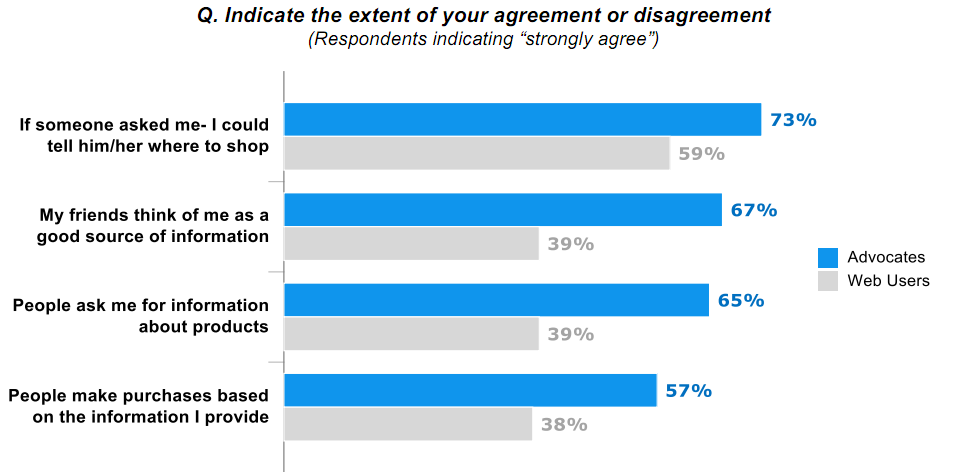
Starting an influencer program does not have to be expensive. Note researcher Jeremiah Owyang's observation that even experienced large brands don't have to spend a lot of money to maintain effective advocate programs.
Get World-Class Marketing Training — All Year Long!
Are you facing doubt, uncertainty, or overwhelm? The Social Media Marketing Society can help.
Each month, you’ll receive training from trusted marketing experts, covering everything from AI to organic social marketing. When you join, you’ll also get immediate access to:
- A library of 100+ marketing trainings
- A community of like-minded marketers
- Monthly online community meetups
- Relevant news and trends updates
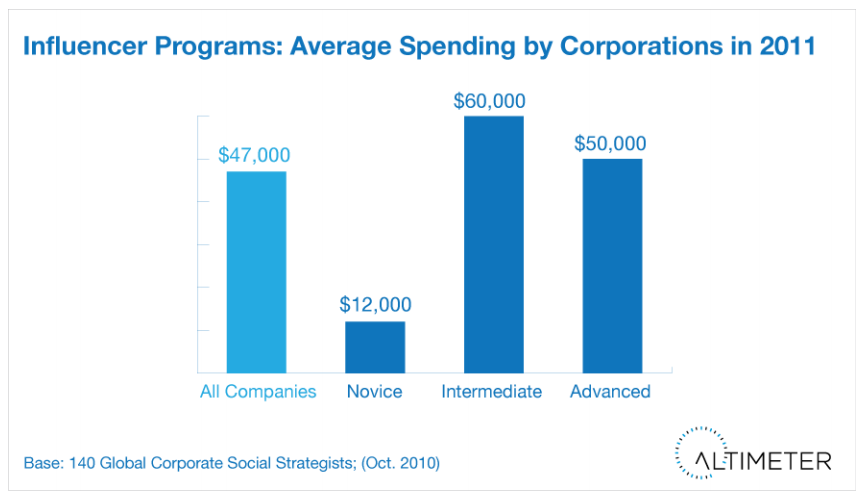
#3: Advocates love to talk and are probably already talking about your brand
Brand advocates are 83% more likely to share information than the average internet user. What's more, 54% of advocates view information-sharing as a form of relaxation.
Notice that brand advocates are also motivated to make decisions, solve problems and contribute to a pool of information.
Smart businesses make it easy for brand advocates to share information about their brand. Provide relevant information through your blog, Facebook page or through exclusive emails and watch advocates share it.
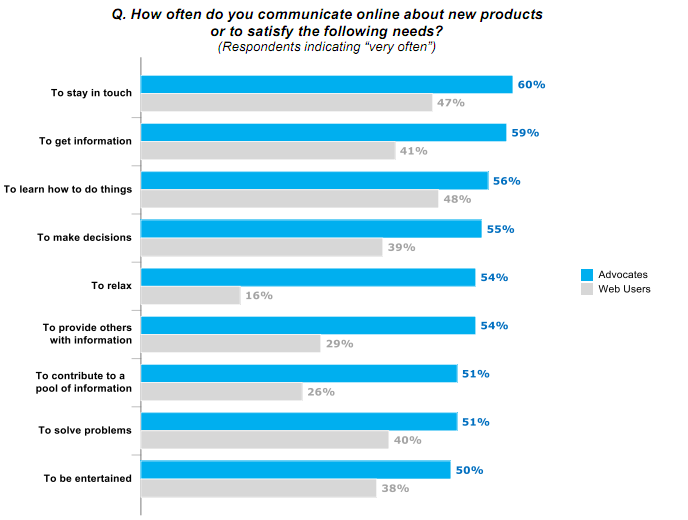
#4: Advocates like to use social media to help people
At their core, brand advocates like to help others. They don't hoard information to inflate their egos; they want to be seen as useful.

Discover Proven Marketing Strategies and Tips
Want to go even deeper with your marketing? Check out the Social Media Marketing Podcast! Publishing weekly since 2012, the Social Media Marketing Podcast helps you navigate the constantly changing marketing jungle, with expert interviews from marketing pros.
But don’t let the name fool you. This show is about a lot more than just social media marketing. With over 600 episodes and millions of downloads each year, this show has been a trusted source for marketers for well over a decade.
Advocates love to meet new people through social media. In fact, they are 2.5 times more likely to use social media to expand their circle of friends.
In case you're skeptical, be forewarned that advocates are not purely altruistic. They also want to get something out of this. Be willing to give them what they're looking for.
Notice that receiving free products and other incentives rank at the top of their list. But deep satisfaction also comes from helping others make good decisions.
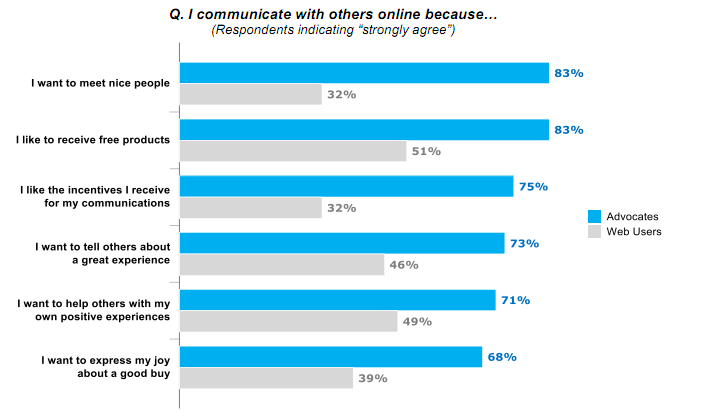
 Not all advocates will be enticed by discounts and rewards. Some of them will even find it offensive and inauthentic. Word-of-mouth marketing expert Andy Sernovitz says that you shouldn't mix love and incentives. Make sure your advocates don't feel like you're forcing them to praise you without having freedom to voice concerns and critiques.
Not all advocates will be enticed by discounts and rewards. Some of them will even find it offensive and inauthentic. Word-of-mouth marketing expert Andy Sernovitz says that you shouldn't mix love and incentives. Make sure your advocates don't feel like you're forcing them to praise you without having freedom to voice concerns and critiques.
#5: Advocates want to be known for their valuable insights
Advocates like helping people and getting free stuff, but they're deeply motivated by recognition. In fact, they're 150% more likely to value being seen as a reliable source of information.

Social Media Examiner does this well through their Fan of the Week program.

#6: Advocates are most likely to use social media for sharing their opinions
Advocates are twice as likely to share product information on social networks than average web users. In fact, social media is their first choice for sharing their insights.
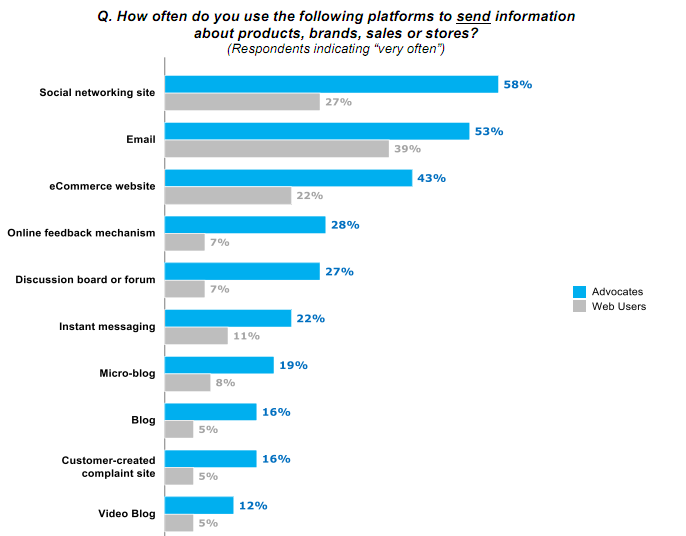
#7: Advocates have a broader reach
Here's something that sets brand advocates apart from the crowd: advocates are 3 times more likely to share brand information with someone they don't know.
Brand advocates love meeting people online. Given their desire to influence people and share information, it's predictable that their messages will reach a much broader audience than the average web user.
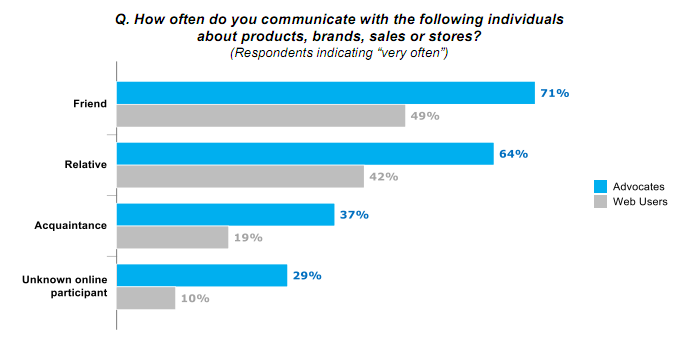
#8: Advocates like talking about their product choices.
Advocates love to talk about their daily product and service decisions. Their top three topics to discuss are: food or dining, personal care products and household products.
How do these topics relate to your products or services? If your company's deliverable is not on this list, you may need to work harder at giving advocates a reason to talk about you.
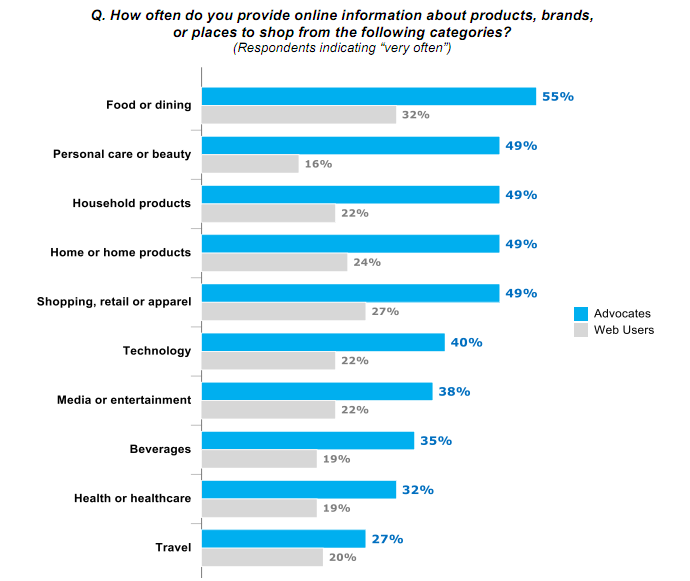
#9: Advocates are loyal to brands with which they have a relationship
Why do advocates do what they do? They appreciate the incentives and rewards, but at the end of the day, they want to be known as a trusted agent of the brand. The relationship is important to them.
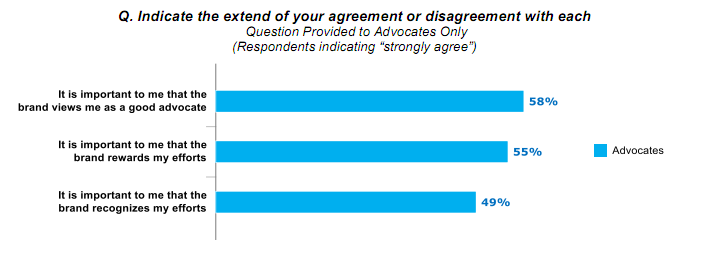
Should your company use brand advocates?
That obviously depends on your business. I would recommend you do two things:
- Look for people who are already talking openly and honestly about your brand. Invite them to help you build a program that will be meaningful for you and your future advocates.
- Think through carefully the costs and benefits of an advocacy program. Nichole Kelly wrote a helpful article recently helping you weigh the pros and cons of an advocacy program. Check it out.
What about you?
What do you think? If you have an advocacy program, we'd love to hear how your experience compares to this study. If you're contemplating starting a program, what's holding you back? Leave your comments in the box below.
Attention Agency Owners, Brand Marketers, and Consultants

Introducing the Marketing Agency Show–our newest podcast designed to explore the struggles of agency marketers.
Join show host and agency owner, Brooke Sellas, as she interviews agency marketers and digs deep into their biggest challenges. Explore topics like navigating rough economic times, leveraging AI, service diversification, client acquisition, and much more.
Just pull up your favorite podcast app, search for Marketing Agency Show and start listening. Or click the button below for more information.

